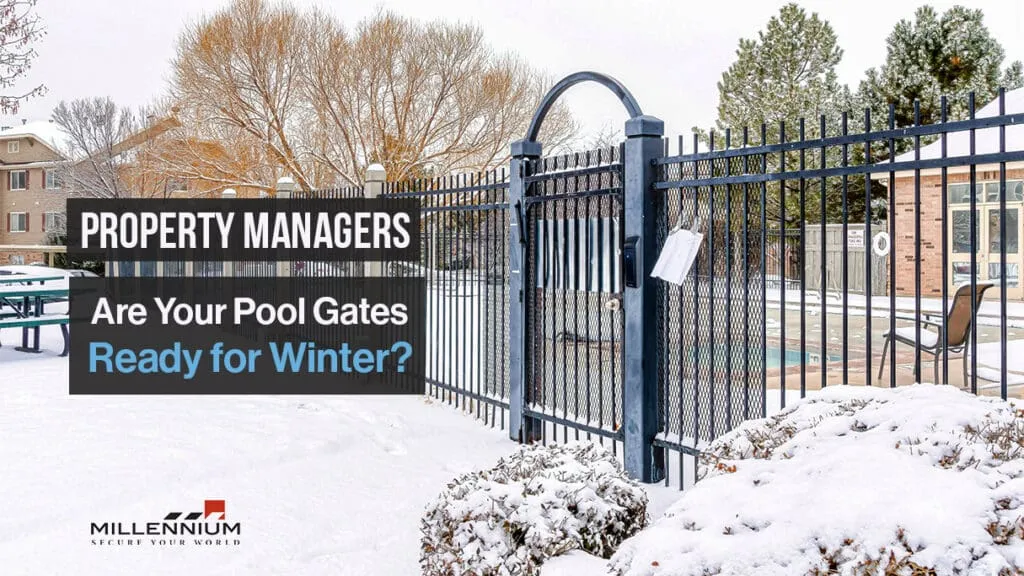Pool Gate Access Control Systems: Enhancing Safety and Security for Property Managers

As property managers gear up for the winter season and prepare next year’s budgets, the importance of securing pool areas cannot be overstated. Pool gate access control systems are not just a convenience—they are essential for ensuring safety, compliance, and peace of mind. Properly secured pool gates prevent unauthorized access, reduce liability risks, and safeguard community members from accidents. With winter on the horizon, now is the perfect time to evaluate your property’s security measures and consider advanced solutions like pool gate access control systems, which provide robust security year-round. Understanding Pool Gate Regulations Pool gate regulations vary widely across states, but their purpose remains consistent: to ensure safety and prevent unauthorized access. For instance: In Florida, all pool barriers must be at least four feet high, with self-latching and self-closing gates. Other states may mandate specific heights, materials, or locking mechanisms for pool enclosures. Non-compliance can result in hefty fines, legal liabilities, and increased risks for property managers. Whether your pool is open year-round or closed for the season, maintaining regulatory compliance is a critical aspect of property management. By investing in pool gate access control systems, property managers can address these regulatory challenges while elevating safety and convenience for residents. Remote Management: Revolutionizing Pool Area Security One of the greatest advancements in Swimming Pool Access Control is the integration of remote management capabilities. These systems allow property managers to monitor and control pool gates from anywhere, ensuring 24/7 security. Key Features of Remote Management: Real-Time Access Monitoring: Remote access control systems provide live updates on who enters and exits the pool area. This is particularly beneficial during off-hours or when property staff is unavailable. Instant Notifications: With alerts sent directly to your device, you can respond immediately to unauthorized access attempts, reducing risks and maintaining compliance. Flexible Access Permissions: Grant or revoke access remotely based on user status. For instance, if a resident moves out, their keyless access can be deactivated instantly without needing to replace physical keys or locks. Cloud-Based Convenience: Cloud-connected pool gate access control systems eliminate the need for on-site monitoring. They also allow you to generate reports for compliance audits or incident reviews with ease. By embracing remote management, property managers can ensure that Swimming Pool Access Control is both efficient and effective, regardless of the season. The Role of CCTV Integration in Pool Gate Security Integrating pool gate access control systems with CCTV surveillance provides an added layer of security and accountability. While access control systems manage who enters, CCTV offers visual confirmation and evidence when needed. Benefits of Integration: Enhanced Monitoring: Real-time footage synced with access logs allows you to verify whether an individual using a gate has proper authorization. Incident Resolution: Should an incident occur, video recordings combined with access data make it easier to investigate and resolve disputes. Deterrence: The presence of cameras near pool gates discourages unauthorized access, reducing potential liability for property managers. Automated Alerts: Systems can be configured to trigger alerts when suspicious activity is detected, such as someone attempting to force open a gate. Integrating CCTV with Swimming Pool Access Control creates a comprehensive security solution that protects both residents and property assets. Locking Mechanisms and Regular Inspections Ensuring pool gate security requires a combination of robust locking mechanisms and routine maintenance throughout the year. Advanced Locking Mechanisms: Keyless Entry Systems: Ideal for community pools, keyless systems use mobile credentials or access fobs, providing residents with a seamless and secure way to enter the pool area. These systems eliminate the hassle of physical keys, which can be lost or duplicated. Swimming Pool Gate Locks: Electronic locks offer enhanced security by requiring specific credentials for entry. They can also be integrated with remote management platforms, allowing property managers to control access in real-time. Child-Proof Safety Locks: These locks are designed to prevent unsupervised children from accessing the pool area, reducing the risk of accidents and ensuring compliance with safety regulations. Regular Inspections: Conducting periodic checks of pool gates and locks is essential for maintaining security. Key focus areas include: Ensuring all gates latch securely. Verifying that electronic locks are functional and software is updated. Inspecting for wear and tear caused by weather or frequent use. By combining advanced Swimming pool gate locks with regular inspections, property managers can maintain high safety standards year-round. The Challenge of Budgeting for Access Control Investing in pool gate access control systems might seem like a significant expense initially, but the long-term benefits far outweigh the costs. Effective access control minimizes liability risks, enhances resident safety, and reduces unauthorized use of amenities. Key Budgeting Considerations: Cost-Effective Solutions: Systems like keyless entry or mobile access credentials often have a lower total cost of ownership compared to traditional lock-and-key setups, especially when factoring in lost keys or lock replacements. Scalability: Many modern systems are scalable, allowing property managers to expand their access control capabilities as their needs evolve. Future-Proof Investments: Cloud-based solutions ensure compatibility with emerging technologies, safeguarding your investment for years to come. Mobile Credentials vs. Key Fobs: Which Is Right for Your Property? Mobile Credentials: Mobile credentials offer unparalleled convenience by allowing residents to use their smartphones as access keys. Key features include: Contactless Access: Ideal for hygienic, touch-free entry. Instant Updates: Credentials can be issued, modified, or revoked in real time without physical interaction. Cost Savings: Reduces the need to purchase and distribute physical fobs or cards. Key Fobs: Key fobs remain a popular choice for properties due to their simplicity and reliability. Benefits include: Durability: Resistant to wear and tear, making them ideal for high-traffic properties. Ease of Use: Fobs are straightforward and user-friendly, requiring no technical knowledge from residents. Compatibility: Can often be integrated with existing access control systems. When deciding between mobile credentials and key fobs, consider the preferences of your residents and the infrastructure of your property. Conclusion Securing pool areas with pool gate access control systems is an essential step for property managers looking




